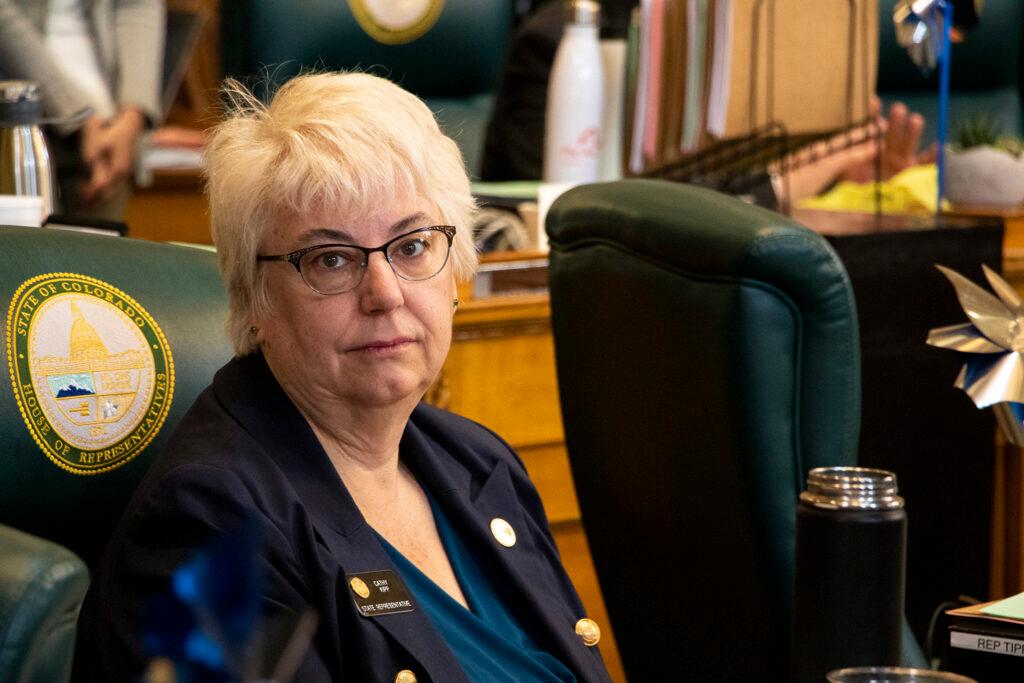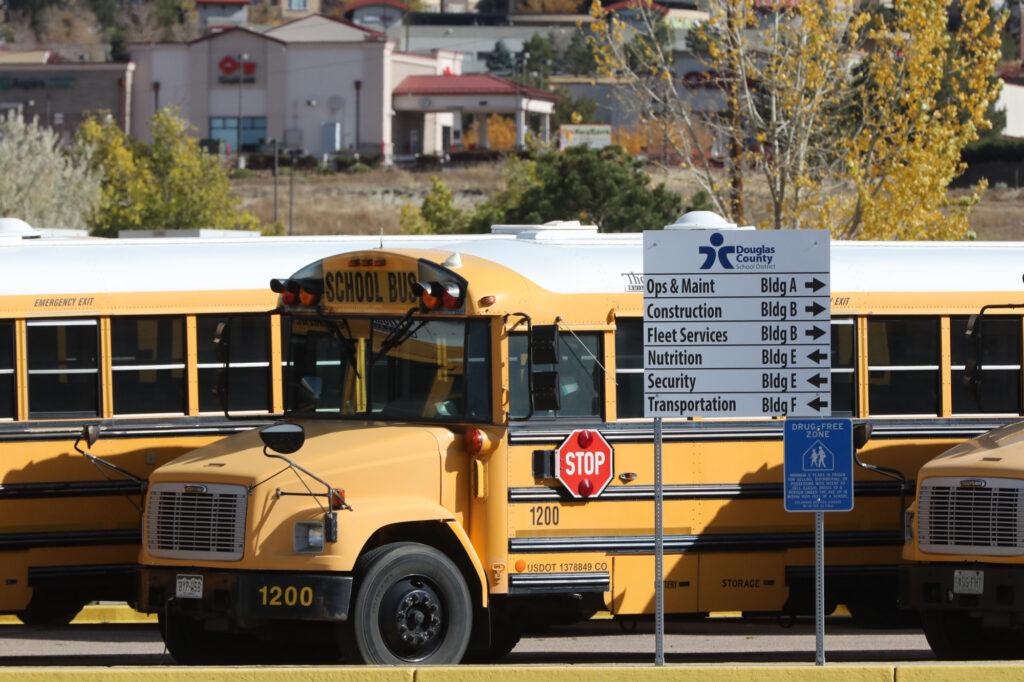
After a Larimer County paraprofessional with a history of child abuse was accused of punching autistic kids on a Poudre School District bus in May 2023, parents had questions.
Lots of questions. Like how did he get hired despite his criminal record? How long did the school district know about this without telling parents? What is being done to prevent it in the future?
To try and get answers, they turned to Colorado’s Open Records Act, or CORA, which requires governments to provide citizens with public documents in a timely fashion.
The parents found a recording of an August 2023 meeting, where a subcommittee of the Poudre School Board discussed ways they might have avoided hiring the bus aide with a violent past.
Then the board members turned to another concern: How to reduce the number of requests the district was getting for public records. They wanted some new restrictions added statewide to CORA.
Ten months later, the parents’ effort to find the truth - just the latest skirmish in more than a decade of mistrust between parents of autistic and disabled students and their local school district in Fort Collins - has spilled into the Colorado Legislature. It could lead to what advocates call a major step backward in government transparency.
'Fishing expeditions'
State representatives, acting on a request from the Poudre district submitted through the Colorado Association of School Boards (CASB), are now considering a bill that could label particularly nosy citizens statewide as “vexatious requesters.” Once given that title by a judge, governments could delay the production of otherwise public records to those people.
The bill would also eliminate public access to the work calendars for most government workers. The news media would be exempted from the proposal, but the definition of news media is sure to be tested should it become law.
“When it relates to [Poudre] School District supporting this is like, you know, this feels very adversarial,” said Sabrina Herrick, whose autistic daughter was among those assaulted on the Poudre school bus last year. “Parents are concerned and asking questions, and they want to be able to label parents vexatious.”
Bill sponsor Rep. Cathy Kipp, D-Fort Collins, served on the Poudre School District board from 2011 to 2019 and volunteered on district panels and in schools for years before that. She vehemently denies that she’s trying to silence parents.
“My bill has nothing to do with the situation that these parents and their children endured, what happened to them was horrible,” said Kipp. “They think it’s targeted at them … that’s not the case.”
Instead, Kipp said, a group of parents is actually targeting her - unfairly.
“They are following me around, they said some very nasty things about me,” Kipp said. “They do not like me … I am telling you that there is no connection from their particular requests of those parents to my bill. My bill would never try and shut down anybody who has a legitimate right to information.”
But the timing of Kipp’s bill lines up neatly with concerns expressed by Poudre board members and CASB in 2023 after the outcry over the hiring of the bus aide and the assaults of students.

Less than three months after the assaults, at an Aug. 8, 2023, meeting of Poudre board members, then Board President Rob Petterson first proposed changes to CORA that - through either collaboration or coincidence - would eventually be included in HB24-1296, the vexatious requester bill.
“There appears to be more appetite to make some amendments to CORA, to address some of the, we’ll call them ‘fishing expeditions,’” said Petterson. His term ended last year.
A recording of the subcommittee meeting, held on Zoom, was obtained through a CORA request made by a Poudre School District parent. It shows other board members helping to craft the broad outlines of the eventual bill, even contemplating an exemption for the news media that was later added to the bill.
Eventually, the bill that emerged in the state capitol six months after the meeting was remarkably similar in several respects to what the Poudre school board subcommittee contemplated in the summer of 2023. And while it is not unprecedented for local governments to suggest statewide fixes for local concerns, parents in the district said it’s no coincidence that it’s sponsored by Kipp, a former Poudre school board member, now in her third term in the state legislature.
'I've been lied to'
To those parents, this CORA bill is part of a long history of putting up roadblocks to records requests, especially for families with disabled children. In 2014, it was revealed that the district had once demanded that staff “delete AND destroy email or paper records related” to a family of an autistic child, to subvert CORA.
Many parents of children who are autistic, deaf, or blind believe that the district does not follow through on Individualized Education Plans (IEPs) designed to help some students get schooling tailored to their specific conditions. To them this bill, limiting records releases, feels personal.
“I've been lied to by the school district,” said Dani Lawrence, whose son goes to a Poudre school and is visually impaired. “And to be able to determine what my kid wasn't educationally getting I had to make a CORA request of written correspondences between people, and when I did that I found out that they hadn't been doing the Braille education for four months.”

The arrest of the aide for the bus assaults prompted more records requests from parents, some of whom were already frequent requestors. Lawrence said it was parents who discovered key details of the bus incidents.
“That story is what I believe Cathy Kipp is trying to silence,” Lawrence said.
A spokesperson for the Poudre School District said they couldn’t accommodate a request for an interview because it was spring break. CPR News reached out to individual school board members, and former members — they did not respond to requests for comment.
'The fee will be ... $9,330'
Curtailing “fishing expeditions” is mentioned repeatedly in the Poudre meeting. But Jeff Roberts, with the Colorado Freedom of Information Coalition, said allowing citizens to explore what the government is doing with their money is exactly the reason we have an open records law.
“CORA, the Colorado Open Records Act, is a fishing license,” Roberts said. “It permits people to make requests for government information so they can keep on top of what government is doing. That's the point of the law.”
Overly broad requests are already subject to extraordinary fees, said Roberts. As an example, CPR News asked four different governments for records last week: all logs of CORA requests for two years and any email correspondence on CORA requests for a three-month period in 2023.
Jefferson County, Broomfield, and Poudre School District responded with partial records — providing CORA logs. Jefferson County quoted an estimate of $9,330 to review the email records and fulfill the request. Broomfield quoted $495 for emails. Poudre quoted $165 for the email records.
Douglas County School District had not provided any records or estimates as of Tuesday evening.

Governments are allowed to charge $33.58 per hour to requesters, and that money typically must be paid upfront before a request is fulfilled.
In requesting that CASB support new CORA restrictions, the Poudre board provided some stats:
“Last school year, Poudre School District alone had 272 requests, while the average for the 5 school years prior to the 2021-2022 school year was 59.9,” reads the resolution, noting that one requestor made up a third of all requests in the 2021-2022 school year. “The additional workload created by the increasing volume of CORA requests is diverting resources and attention that should be devoted to our students.”
And while requesters are required to pay for the information their taxes already paid to the government to collect, Kipp has argued that the current fee doesn’t cover the cost of review and redaction of records. That fee rises along with inflation and is set to be reset in July 2024, perhaps to as high as $41.34 an hour.
The Poudre School District website lists eight employees in the communications department doing everything from video production to general communications for the district. Board members there and in other government agencies argue their staffs are overwhelmed by open records requests. Kipp’s bill would give governments more time to respond to records requests in cases where a records custodian was on vacation or otherwise not available.
It’s part of a group of bills this session closing off public access to public business.
First, state lawmakers exempted themselves from portions of Colorado’s sunshine laws, giving them more freedom to have small group conversations outside public view. That’s already been signed into law by Gov. Jared Polis. There’s another law that would limit the release of autopsies in cases involving the deaths of juveniles, potentially making it all but impossible for independent researchers or journalists to expose government or medical mistakes. And then there’s Kipp’s CORA bill.
“I think it's really strange that that we have all this happening in one session,” Roberts said. “It's very difficult to get the legislature interested in creating more access, as opposed to what's happening now.”
Sabrina Herrick, whose daughter attends a Poudre school, said the district is creating more work for themselves by not just posting more online. The CORA requests she’s seen are not looking for personal private information, but things like receipts from work travel for the superintendent or calendars to see who people are meeting.
One parent posts the documents on a website, similar to how some cities, including Denver, post public documents online.
“They're not asking for anything unreasonable,” said Herrick. “They could just be posting this online for people to see and they're choosing not to and that's why people are requesting it.”
The Poudre district made another request of CASB this year, asking for legislative clarification around hiring rules that might have prevented the man with a history of child abuse from getting a job on a Poudre district school bus. That request has not as of now resulted in legislation.









